
It seems that this winter has been a season chock full of rumors, transfers and changing allegiances as everyone and their mother has decided to check out if the grass is really greener on another side of the collegiate scene. One runner however, remains loyal to the uniform that hung from his shoulders while he accomplished some of most stunning races in NCAA history. That runner is University of Virginia mid distance enthusiast, Robby Andrews. But is he right to stay? Are the others wrong to leave?
After a veritable clown car of vagabond harriers announced their intentions to join new programs, Andrews seemed like he’d surely be the next to say goodbye. Many were expecting the standout to take his talents to the professional circuit and follow the man who oversaw his rise to the top, Jason Vigilante. It had to have crossed his mind at some point that Centro just signed a several hundred thousand dollar deal, and that he could be worth a hefty sum himself. He also has to know that there are no guarantees in this life and anything can happen in his next few years at UVA. Hell, he could wake up for a morning run tomorrow and get hit by Pete Watson's car for all we know. But those possibilities accounted for, Andrews shows the poise and confidence to stick it out at Virginia, as if to say I’ve got a whole lot more I want to accomplish first.
Elsewhere around the country though, several big name (which is a relative term when Andrews is included in the conversation) runners demonstrated an eagerness to abandon places where they have already accomplished a great deal in favor of new challenges and opportunities. But why?
Sure, I can grasp that maybe Dunbar wants to spend the last of his days lighting up Hayward Field. Masters and Patrick Casey perhaps wants to be a part of more of a group dynamic. Hurysz I would have expected to follow Watson, but apparently he’s going to be a Buffalo. But still, with solid credentials and presumably a bit of scholarship money already in hand, not to mention friends, teammates, and a few semesters worth of potentially non-transferable credits, what is really to be gained for these runners long term?
It seems more and more that athletes are gravitating towards schools that offer professional opportunity in track and field. CU has consistently produced some of the best pros our country has ever seen and is home to several clubs, Oregon has the OTC in their backyard, and if Martin Smith's group of harriers stuck around after graduation they could potentially have a pretty solid training group as well. See a trend?
I’m not suggesting some back alley, Blue Chip-esqe conspiracy. Rather, these kids are smart enough to realize that these are the schools that practically breed professional runners, and that window of opportunity is only there for so long.
Consider Steve Finley, a former teammate of Andrews before he decided to spend his last year competing as a Duck. Steve had a stellar senior year that included running under 8:45 for the 3k steeple on two separate occasions. As can often happen though, Steve’s long season took a toll in him as he finished a disappointing 13th place at NCAAs.
Now had this result occurred while Steve was at Virginia, it’s plausible to think the OTC might be a bit cautious about sponsoring Steve thinking that he might choke when the pressure’s on (trust me, he doesn’t). However, as a Duck he was able to demonstrate to Vin Lananna—who from everything I can gather is some sort of patron saint in Eugene—on a daily basis that he had what it takes to train and compete at an elite level.
Not to say there wouldn’t have been options for Steve still, but rather than waiting to see, he took the matter into his own hands and did what every runner dreams to do; he said damn it all I’m going for it. What many would call a good personal decision on Steve’s part to move out west, many others would be quick to dismiss as inconsiderate to the teammates and coach he left behind. What Steve really left behind though was an ever-thinning roster and a coach whom, just like Steve, had to make a tough decision that would ultimately favor his long term plans. What many label as a selfish, personal decision, I would instead call a business decision and the wise one at that.
We call our sport a team sport, but when you’re 22 and looking for the next step all you see are individuals, especially on the track. Sure there are still team dynamics, but there’s a reason they are so often referred not as teams but as training groups. There’s an understanding along the lines of the more the merrier, but at the end of the day everyone is there to fulfill their own ambitions, Olympic or otherwise.
Perhaps we should have seen this all coming once Lukas left. Even though he is now absent from our sport, it is as if he set a trend on his way out. Though many question whether or not his departure from the U of O was morally just to his team, the young man’s intentions were in the name of Olympic glory; and like it or not that means just a bit more in this world than the Pepsi Invitational. Even if you disagree with the decision, you can’t help but feel some empathy how incredible a feat he is trying to accomplish. When you’re as good as Lukas, that is surely an ambition that you must place above all else. Your commitment to that goal must come well before your commitment to a bunch of kids you just met that happened to graduate from high school when you did if you’re to ever achieve it.
And even though this current crop of transfers’ chances of Olympic grandeur are razor thin compared to Lukas, it’s conceivable that these runners might be chasing an entirely different dream: a dream of running professionally. And if spending a year or two after college competing around the world is as good as it gets for them, who is anyone to say that the dream has any less weight than Olympic ambitions? After all, the most satisfying part of our sport is the feeling that you have properly fulfilled your potential-so why should the size of the stadium have any affect on our approval or dismissal of someone else’s aspirations?
In his decision to stay, Andrews displayed a great deal of confidence, or as he hashtagged on his twitter, #faith, something I believe that all these runners have in common. No matter their decisions, they have a very sincere trust that the path they are choosing is the one they must take. You can look at either side of the coin and call it selfish or stupid or a mistake, but the bottom line is these athletes are great because they have the balls to know what they want and better yet don’t hesitate to reach their destination.
The peanut gallery meanwhile can poke and prod and ponder all it wants, but I would bet that these athletes have discarded these questions from their heads almost as soon as their answers were announced. Letsrun threads can drag out for weeks, until they’re forgotten, waiting for one bad race to be bumped back up to the top again. Every performance from here on in becomes a testament to how right or wrong they were. But whether it’s a PR or a DNF, the ones who will make it will not be concerned with a misstep here or there. They’ll simply remind themselves to stay the path.
Best of luck to all of these athletes in their 2012 season
Related Content
 Parker Wolfe, BYU Make Statements At Nuttycombe Invitational
Parker Wolfe, BYU Make Statements At Nuttycombe InvitationalSep 27, 2024
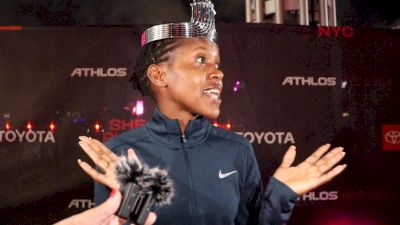 Faith Kipyegon On Ending Season With ANOTHER 1,500m Win At Athlos NYC 2024
Faith Kipyegon On Ending Season With ANOTHER 1,500m Win At Athlos NYC 2024Sep 27, 2024
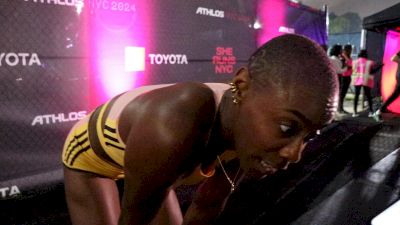 Shamier Little On Prize Money, "Princess" Treatment And More At Athlos NYC 2024
Shamier Little On Prize Money, "Princess" Treatment And More At Athlos NYC 2024Sep 27, 2024
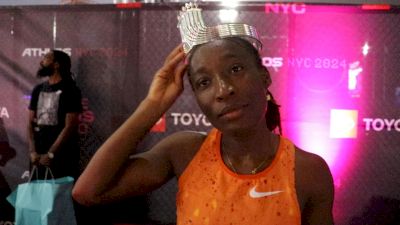 Marie-Josée Ta Lou-Smith Wins 100m, Reflects On How Far Women's Track Has Come At Athlos 2024
Marie-Josée Ta Lou-Smith Wins 100m, Reflects On How Far Women's Track Has Come At Athlos 2024Sep 27, 2024
 From Eliud Kipchoge to Tigst Assefa: Berlin Marathon's World Record Past
From Eliud Kipchoge to Tigst Assefa: Berlin Marathon's World Record PastSep 26, 2024
 Gabby Thomas is Pumped Up for the Future of Track and Field and Athlos
Gabby Thomas is Pumped Up for the Future of Track and Field and AthlosSep 26, 2024
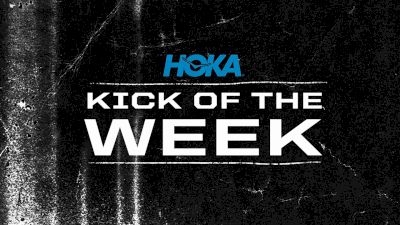 HOKA Kick of the Week: South Carolina Surge
HOKA Kick of the Week: South Carolina SurgeSep 25, 2024
 Berlin Marathon 2024 Schedule: What To Know
Berlin Marathon 2024 Schedule: What To KnowSep 25, 2024
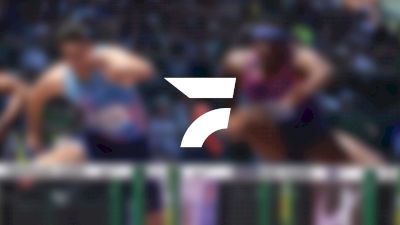 How to Watch: 2024 Art Kadish Elm City Challenge | Track and Field
How to Watch: 2024 Art Kadish Elm City Challenge | Track and FieldSep 25, 2024